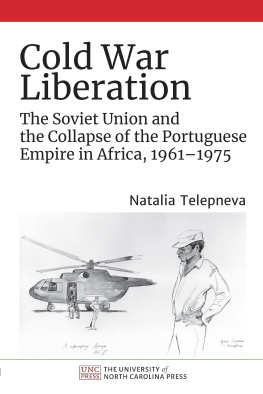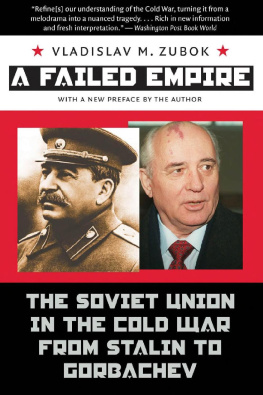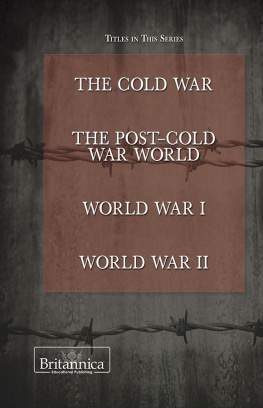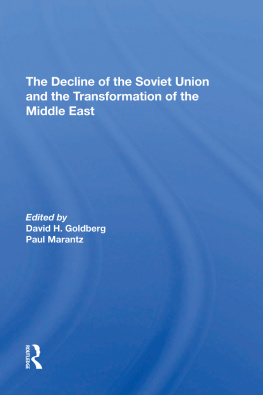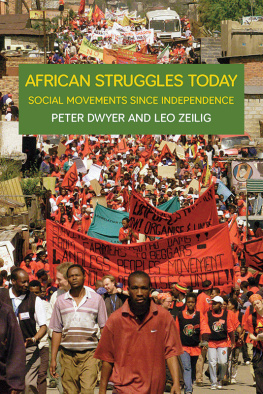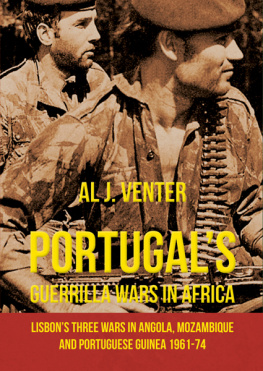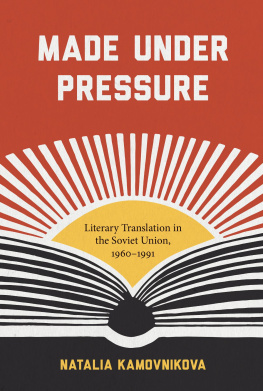Contents
Guide

Cold War Liberation
The New Cold War History
Odd Arne Westad, editor
This series focuses on new interpretations of the Cold War era made possible by the opening of Soviet, East European, Chinese, and other archives. Books in the series based on multilingual and multiarchival research incorporate interdisciplinary insights and new conceptual frameworks that place
historical scholarship in a broad, international context.
A complete list of books published in The New Cold War History
is available at www.uncpress.org .
Cold War Liberation
The Soviet Union and the Collapse of the
Portuguese Empire in Africa, 19611975

Natalia Telepneva
the University of North Carolina Press
Chapel Hill
2021 The University of North Carolina Press
All rights reserved
Set in Garamond Premier Pro by PageMajik
Manufactured in the United States of America
The University of North Carolina Press has been a member of the
Green Press Initiative since 2003.
Library of Congress Cataloging-in-Publication Data
Names: Telepneva, Natalia, author.
Title: Cold War liberation : the Soviet Union and the collapse of the
Portuguese empire in Africa, 19611975 / Natalia Telepneva.
Other titles: New Cold War history.
Description: Chapel Hill : University of North Carolina Press, [2021] |
Series: The new Cold War history | Includes bibliographical
references and index.
Identifiers: lccn 2021052598 | isbn 9781469665856 (cloth) |
isbn 9781469665863 (paperback) | isbn 9781469665870 (ebook)
Subjects: lcsh : RevolutionariesAngola. | RevolutionariesMozambique. |
RevolutionariesGuinea-Bissau. | Soviet UnionRelationsAngola. |
AngolaRelationsSoviet Union. | Soviet UnionRelationsMozambique.
| MozambiqueRelationsSoviet Union. | Soviet
UnionRelationsGuinea-Bissau. | Guinea-BissauRelationsSoviet
Union. | AngolaHistoryRevolution, 19611975. |
MozambiqueHistory18911975. | Guinea-BissauHistoryRevolution,
19631974. | PortugalColoniesAfrica.
Classification: lcc dt 1402 . t 45 2021 | ddc 967.3/03dc23/eng/20220107
lc record available at https://lccn.loc.gov/2021052598
Cover illustration: Viktor Kobelev, At Luanda Airport. Electrician Juan Garcio. Used by permission of Sputnik News.
To the loving memory of my grandfather,
Moisei Slutskii (19202005)


This book is published as part of the Sustainable History Monograph Pilot. With the generous support of the Andrew W. Mellon Foundation, the Pilot uses cutting-edge publishing technology to produce open access digital editions of high-quality, peer-reviewed monographs from leading university presses. Free digital editions can be downloaded from: Books at JSTOR, EBSCO, Hathi Trust, Internet Archive, OAPEN, Project MUSE, and many other open repositories.
While the digital edition is free to download, read, and share, the book is under copyright and covered by the following Creative Commons License: BY-NC-ND 4.0. Please consult www.creativecommons.org if you have questions about your rights to reuse the material in this book.
When you cite the book, please include the following URL for its Digital Object Identifier (DOI): https://doi.org/10.5149/9781469665887_Telepneva
We are eager to learn more about how you discovered this title and how you are using it. We hope you will spend a few minutes answering a couple of questions at this url:
https://www.longleafservices.org/shmp-survey/
More information about the Sustainable History Monograph Pilot can be found at https://www.longleafservices.org .
Contents
ILLUSTRATIONS
PAIGC combatants during military training in
the Soviet Union, undated112
MAPS
I have accumulated many debts whilst finishing this book, intellectual and otherwise. I am grateful to Arne Westad, who has been a consistent champion of this project, giving the much-needed encouragement and important feedback over the years. He has pushed me to see the bigger picture and his own work has provided a source of inspiration. This book started as a project, which focused primarily on the Cold War and high politics, but it has evolved in other directions, partly under the influence of the very talented people I have collaborated with over the past years. In particular, I would like to thank David Anderson for encouraging me to think about African politics and Kristin Roth-Ey for inspiring me to conduct oral history interviews. Vladimir Shubin has been extremely helpful, providing important contacts, advice and support over the years. He has been an insightful critic, urging me to question assumptions as well as filling the gaps on some of the key protagonists in this story. The generous British Academy Postdoctoral Fellowship grant provided the crucial basis for conducting research for this book.
My collaboration with Daniela Richterova in putting together the Secret Struggle for the Third World workshop at the University of Warwick in September 2018 allowed me to think broader about the role of secret intelligence in the Cold War. I have learnt a great deal about East-Central Europe whilst working on the edited volume Warsaw Intervention in the Third World with Philip Muehlenbeck, as well as through discussions with colleagues on the Socialism Goes Global project. Jan Koura and Mikul Peta helped me understand the role of Czechoslovakia in this story and organized a useful workshop at Charles University, Prague. In Portugal, I have greatly benefited from participating in the Amilcar Cabral project and from discussions and support from Julio Soares Sousa, Jos Neves, Aurora Almada e Santos, and Catarina Laranjeiro. Rui Lopes has been a wonderful critic and a great friend, whose enthusiasm for this work was uplifting in what was a long journey.
I am deeply indebted to Vladislav Zubok, Artemy Kalinovsky, Jeremy Friedman, Alexander Hill, Eric Burton, Mustafah Dhada, Nathaniel Powell, and Allen Isaacman, who read and gave useful feedback on earlier drafts and chapters from the book. My cousin Andrei Frolov gave extremely useful advice on certain military aspects of this story, spending long hours looking at old photos and explaining to me the technical specifications of Soviet weaponry. I also want to thank George Roberts, James Brennan, Radoslav Yordanov, Alessandro Iandolo, William Minter, Yusuf Adam, Nick Rutter, Irina Filatova, Elizabeth Banks, Corina Mavrodin, Hans-Georg and Ilona Schleicher, Helder Fonseca, Sergei Radchenko, and Iva Cabral for sharing tips on sources and expertise. I am grateful for the books anonymous reviewers who forced me to sharpen the arguments, and to the team of the University of North Carolina Press, especially Debbie Gershenowitz and Andrew Winters, and to Ihsan Taylor of Longleaf Services, in seeing the project through.
While the book has benefited from excellent scholarships and published sources, I relied on extensive archival research and conducted oral history interviews in many corners of the globe to complete the story. I am grateful to the archivists, especially at the Russian State Archive for Contemporary History and the Archive of Foreign Policy of the Russian Federation in Moscow, and the Security Services Archive in Prague who offered good advice and helped in processing requests for sources. In Maputo, I want to thank Clinarete Munguambe and Carlos Jorge Siliya at Centro de Pesquisa da Histria da Luta de Libertao Nacional for helping me getting around and introducing me to ex-combatants. In Cape Verde, Tatiana Neves at the Fundao Amlcar Cabral provided contact details, while Saidu Banguru and Dominika Swolkien gave crucial logistical assistance and made me feel welcome during my trip to Praia and Mindelo. My research trip to Guinea-Bissau would have been a very different experience without the enthusiastic support from Sana Bald and information on ex-guerrillas received from Quentino Napoleon dos Reis at Museu Militar da Luta de Libertao Nacional and Joo Paulo Pinto C and Papis Sadjo Tur at Instituto Nacional de Estudos e Pesquisas. Joana Sousa and Liam Carney translated oral histories from Kriol to English and Kim Friedlander helped improve the readability of the manuscript.

